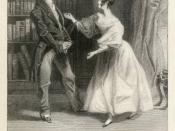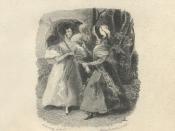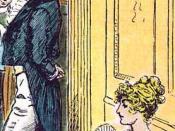fortune, must be in want of a wife' , this is Austen's way of telling us that the fact that a young man is wealthy, makes him the object of desire of all unmarried women. The statement introduces the subject of the romantic novel; courtship and marriage. The sentence also introduces the issue of what the reasons for marrying are. She implies here that many young women marry for money, like Charlotte and Mr. Collins : "I am not romantic you know. I never was. I ask only a comfortable home; and considering Mr. Collin's character, connections, and situation in life, I am convinced that my chance of happiness is as fair, as most people can boast on entering the marriage state", and not necessarily for affection, as is the case of Jane and Mr. Bingley.
Elizabeth is not particularly romantic either, however unlike Charlotte, Elizabeth has a certain picture of an ideal marriage in her mind, and therefore would never marry for reasons other than love.
Since Elizabeth would not marry without love, we can detect some slight hints that what Charlotte does as immoral. Elizabeth also feels that marriages formed by passion alone are just as bad as marriages formed without love. Elizabeth reflects on her sister Lydia's marriage; "But how little permanent happiness could belong to a couple who were only brought together because their passions were stronger then their virtue, she could easily conjecture" We again see reasons besides love as the motive for marriage. The novel is not very optimistic about marriage, in fact there are almost no happy marriages in the novel at all. Mr. Bennet and Mrs. Bennet, Lydia and Wickham, and Charlotte and Mr. Collins are examples of the ill-matched and unsuccessful matches.
However, the characters in the novel are not all...


